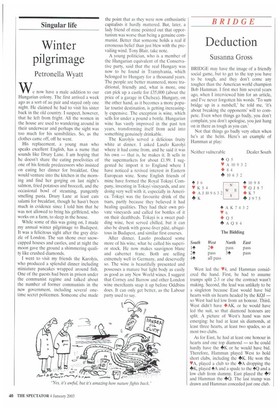Winter pilgrimage
PetroneIla Wyatt
We now have a male addition to our Hungarian colony. The first arrived a week ago as a sort of au pair and stayed only one night. He claimed he had to visit his sister back in the old country. I suspect, however, that he left from fright. All the women in the house are used to wandering around in their underwear and perhaps the sight was too much for his sensibilities. So, as the clothes came off, off he went.
His replacement. a young man who speaks excellent English, has a name that sounds like Drury Lane. I am hoping that he doesn't share the eating proclivities of one of his female predecessors who insisted on eating her dinner for breakfast. One would venture into the kitchen in the morning and find her gorging on last night's salmon, fried potatoes and broccoli, and the occasional bowl of steaming, pungently smelling pasta. Drury Lane at least eats salami for breakfast, though he hasn't been much in evidence since I told him that he was not allowed to bring his girlfriend, who works on a farm, to sleep in the house.
While some of this was going on, I made my annual winter pilgrimage to Budapest. It was a felicitous sight after the grey drizzle of London. The sun shone over snowcapped houses and castles, and at night the moon gave the ground a shimmering quality like crushed diamonds.
I went to visit my friends the Karolyis, who produced a splendid dinner including miniature pancakes wrapped around fish. One of the guests had been in prison under the communist regime and talked about the number of former communists in the new government, including several onetime secret policemen. Someone else made the point that as they were now enthusiastic capitalists it hardly mattered. But, later, a lady friend of mine pointed out that opportunism was worse than being a genuine communist. Better that someone holds a real if erroneous belief than just blew with the prevailing wind. Tony Blair, take note.
A young politician, who is a member of the Hungarian equivalent of the Conservative party, said that the real Hungary was now to be found in Transylvania, which belonged to Hungary for a thousand years. The people are better mannered, more traditional, friendly and, what is more, one can pick up a castle for £35,000 (about the price of a garage in Chelsea). Hungary, on the other hand, as it becomes a more popular tourist destination, is getting increasingly expensive. The exception is wine, which sells for under a pound a bottle. Hungarian wine has vastly improved in the past ten years, transforming itself from acid into something genuinely drinkable.
The Karolyis served a delicious fruity white at dinner. I asked Laszlo Karolyi where it had come from, and he said it was his own — that is, he makes it. It sells in the supermarkets for about £1.99. I suggested he import it to England where I have noticed a revived interest in Eastern European wine. Some English friends of mine have formed the Royal Tokayi Company, investing in Tokayi vineyards, and are doing very well with it, especially in America. Tokayi was the favourite drink of the tsars, partly because they believed it had healing qualities. They had their own private vineyards and called for bottles of it on their deathbeds. Tokayi is a sweet pudding wine, best served chilled, but it can also be drunk with goose-liver pâté, ubiquitous in Budapest, and similar first courses.
After dinner, Laszlo produced some more of his wine, what he called his superior stock. He now makes sauvignon blanc and cabernet franc. Both are selling extremely well in Germany, and deservedly so. The wine is beautifully presented and possesses a mature but light body as easily as good as any New World wines. I suggest that Corney and Barrow and other London wine merchants snap it up before Oddbins does. It can only get better, as the Labour party used to say.


















































 Previous page
Previous page